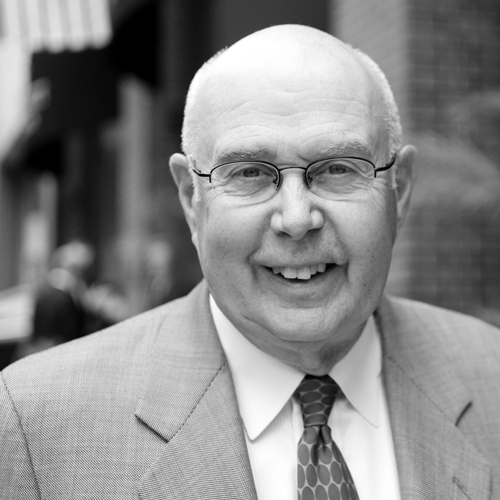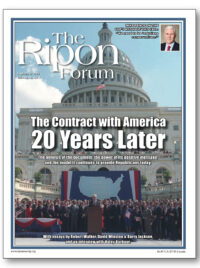 The Contract With America is a story of political perseverance. Its real antecedents were in the formation of the Conservative Opportunity Society in 1983. That group, brought together by Newt Gingrich, had as its mission the transformation of the House Republican Conference and ultimately taking control of the House.
The Contract With America is a story of political perseverance. Its real antecedents were in the formation of the Conservative Opportunity Society in 1983. That group, brought together by Newt Gingrich, had as its mission the transformation of the House Republican Conference and ultimately taking control of the House.
At the time, there was unhappiness in the Conference about the culture that had developed among House Republicans. Having served in the minority for nearly 30 years, many of the more senior GOP Congressmen had decided the best way to be a successful legislator was to go along to get along. They willingly cut deals beneficial to their own districts in return for supporting fundamentally liberal legislation. In other words, they had a minority mentality.
Gingrich and COS were mostly younger Members of Congress who had a desire to see the party fight to become a majority. Gingrich recognized that the change he wanted would take legislative activists committed to using the congressional processes for political battle and development of a unique agenda. The Members he recruited for COS were conservatives, moderates and pragmatists who shared a willingness to engage the Democrats on national issues.
Early leaders of the group included Vin Weber, Hank Brown, Duncan Hunter and me. We began meeting on Wednesday mornings in 121 Cannon and agreed that we had to develop a compelling agenda. The agenda needed to be visionary with a clear view of economic, cultural and societal change. So, we reached out to futurists, including Al Toffler and John Nesbitt, and met with them for hours at a time. What came out of those sessions was grounding in the emerging information economy and the magnitude of the change that the new economy would produce. The futurists’ insight provided us with the foundation for the principles and programs we would advocate.
Ten years before the Contract was announced, COS laid down many of the concepts that found their way into it.
Ten years before the Contract was announced, COS laid down many of the concepts that found their way into it. We understood our outreach needed to be broader than just traditional Republican coalitions. We understood reform of the Congress was a necessary part of addressing the future. We understood that with significant economic change just over the horizon, we needed to have a growth-oriented economy which included, among other things, reduction of the Federal debt and deficit and tax reform that encouraged investment. We understood science and technology would play an increasingly important role in defining national leadership. We understood the lives of the American people would be disrupted by the enormity of the change they would experience so that the religious, educational and cultural institutions would have to be reinforced. We understood that in a world of change, peace would be guaranteed only by strength. And we understood there are moral and constitutional values underpinning a free society that would have to be defended.
It took years of debate, trial and error, and programmatic iterations for these understandings to find their way into the final version of the Contract. But it is significant that our definition of legislative success survived a long journey to ultimate adoption.
The COS began its journey toward the Contract and winning a House majority at an interesting time. C-Span was a relatively new innovation in the House. One of the early successes of COS was exploiting the opportunity to reach hundreds of thousands of people nationwide with our message. We utilized the one minutes at the beginning of the legislative day to address current issues, often deciding just a few minutes beforehand to do a series of one minute speeches. What we really used was the special order time at the end of the legislative day where we could take up to an hour each talking about anything that struck our fancy.
We remember the party’s victory that year as being the start of the Republican Revolution. In reality, it’s an example of what a small band of committed reformers can do when armed with the right ideas.
We soon developed a style of interactive discussion that won quite a deal of interest with the C-Span audience. In fact, we attracted such a national following that then-Speaker Tip O’Neill one day ordered the cameras to pan away from the podium and show the Chamber. The Chamber was practically empty at the time, which was the Speaker’s point – he was hoping to embarrass us or dissuade us from speaking any further. But his decision backfired when he was censured for using unparliamentary language during the House floor debate that ensued. It was the first time since the 18th century that a Speaker of the House had been disciplined in this manner. It was also the moment that helped propel the Conservative Opportunity Society from a small group of Republican backbenchers into a national movement of conservative reform.
Of course, the foundation of this movement rested on ideas – ideas to rewrite the tax code, reshape the welfare system, balance the budget, and revamp Congress itself. These ideas took root in the meetings COS held each week, then spread throughout the Conference following the election of Vin Weber and Duncan Hunter to leadership positions in the mid-1980s and the election of Newt Gingrich as Minority Whip in 1989. After the Contract with America was signed in 1994, public interest in these ideas began to flourish, and the possibility that the GOP could win the House began to grow.
Today, we remember the party’s victory that year as being the start of the Republican Revolution. In reality, it’s more than that. It’s an example of what a small band of committed reformers can do when armed with the right ideas.
They can change history.
___________________________________
Robert S. Walker represented the 16th District of Pennsylvania from 1978 to 1996. He currently serves as Executive Chairman of Wexler Walker Public Policy Associates.




